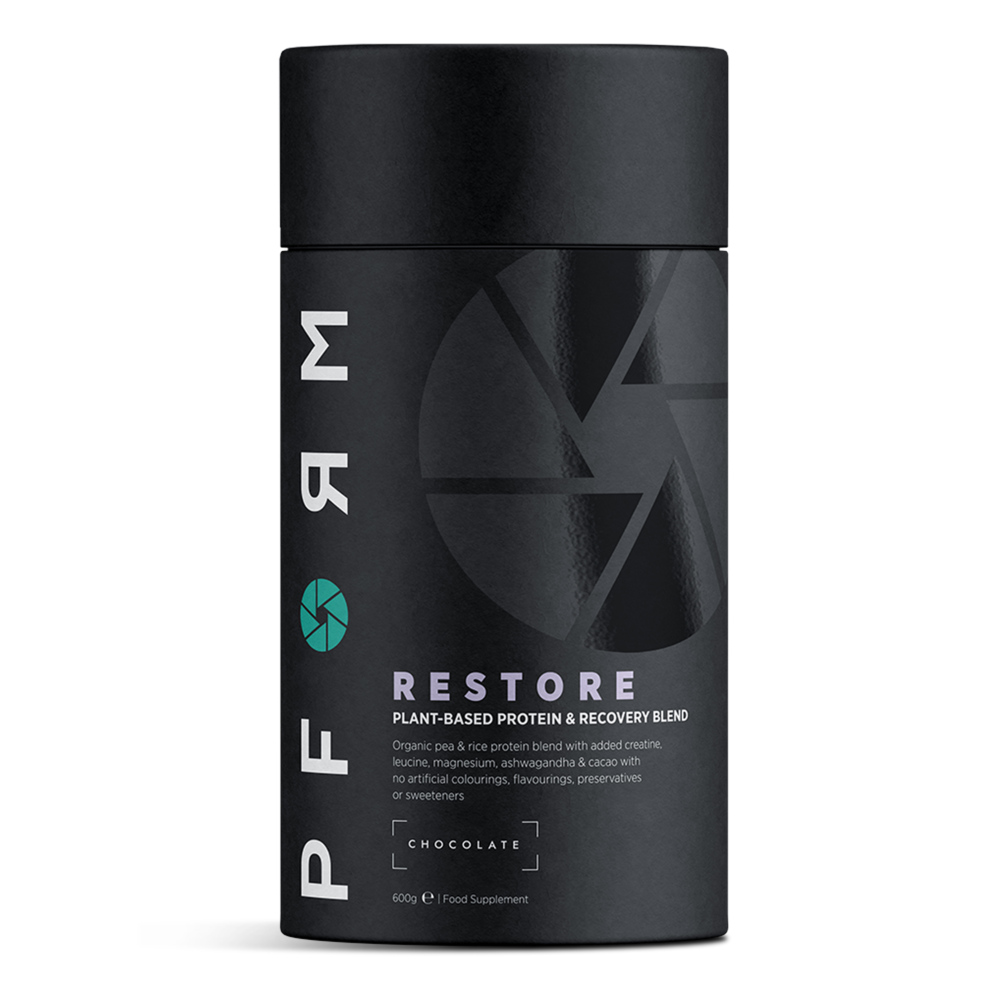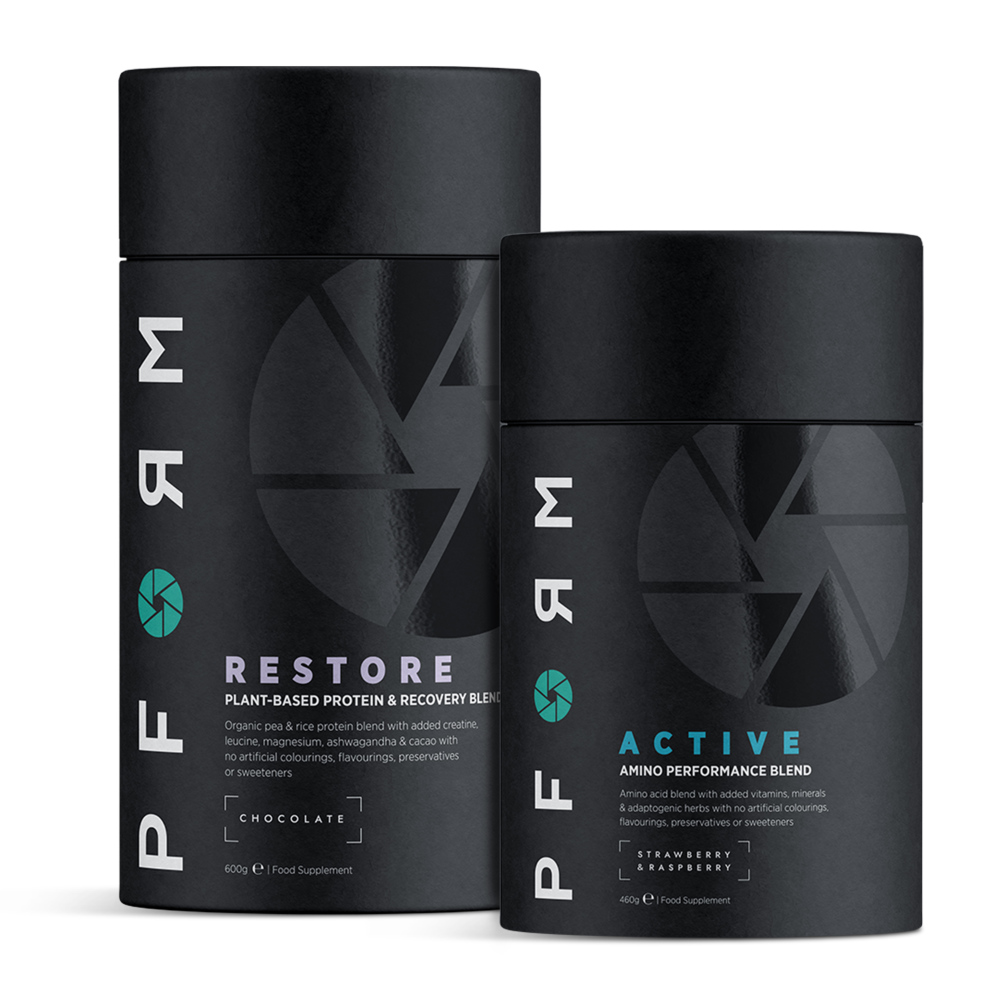
The performance benefits of creatine
Creatine is one of the most popular supplements in the sport nutrition industry. This article covers what creatine is, how supplementation may enhance athletic and exercise performance, and highlights why this was added to our product PFORM Restore.
Introducing Creatine
An amino acid mainly found in muscle cells that is responsible for generating energy (ATP) within the phosphocreatine energy system – one of the three energy systems. The phosphocreatine system generates ATP for short maximal outputs – think maximal effort anaerobic sprint-type exercise. When, phosphocreatine is broken down (into a phosphate group and creatine), ATP is generated. Creatine stores are necessary to combine with the phosphate group to regenerate phosphocreatine for further ATP production.
Muscle stores of phosphocreatine are higher than concentrations of ATP, since ATP can’t be easily stored! Therefore, replenishing adequate muscle stores of creatine can be utilised to generate phosphocreatine and maintain ATP availability. Enter creatine supplementation. Creatine supplementation can increase muscle stores by 20-40% greater and subsequent phosphocreatine stores (1).
Usually about half of the body’s needs for creatine is restored though diet, and the other half through the body making it itself. However, some individuals are likely to require greater amounts of creatine – individual needs vary, athletes who engage in intense training, individuals who are larger and/or those that have adopted a vegetarian/vegan diet (1).
Creatine supplementation increases muscular stores of creatine and is associated with beneficial training adaptations in exercise performance. The science shows creatine supplementation to optimise the recovery process, prevent injury, and aid rehab. For individuals tolerating heavy training loads, creatine supplementation may be particularly beneficial (1).
In addition to athletic specific benefits, increasing research indicates the use of creatine to improve health conditions – for example, neurodegenerative diseases (such as Parkinson’s), heart disease, diabetes, osteoarthritis, depression and aging (1). The science is growing on the role of creatine to improve aging, bone health and sarcopenia (muscle loss) (2,3).
Enhancing performance and recovery with creatine supplementation
Train harder and longer
Supplementation with creatine may improve maximal power and strength – work performed during sets of maximal effort muscle contractions, single effort sprint performance and work performed during repetitive sprint performance all improved post supplementation with creatine (4). Supplementation may maintain muscular performance during high-volume resistance training that otherwise results in small performance decrements (5).
Greater energy production
Supplementation with creatine for 3-4 days results in greater anaerobic energy production (6).
Increased muscle mass gains
Athletes consistently supplementing with creatine may make greater gains in strength and muscle mass (7). Supplementation increases anaerobic power and muscular strength, improving body composition (8).
Enhanced post-exercise muscle protein synthesis
In combination with resistance training, creatine supplementation may enhance the signalling necessary for muscle protein synthesis to make muscle mass gains (9).
Enhanced recovery
Creatine supplementation may help athletes recover from intense training. Co-ingestion of creatine with a workout meal (think carbs + protein in a post workout shake) enhances glycogen (carb stores) restoration (10,11). Glycogen replenishment is key for promoting recovery and preventing overtraining during intense training periods (12). Athletes who deplete large amounts of glycogen during training and/or require maintenance of optimal glycogen levels, may therefore benefit from creatine supplementation.
Reduced muscle damage
Creatine supplementation may improve the rate of muscle recovery after injury (13). This may be due to its inhibitory effects on inflammatory markers (14). Creatine supplementation may reduce muscle soreness and levels of inflammatory biomarkers (15).
Injury prevention
Athletes using creatine experience less muscle cramping, dehydration, muscle tightness, muscle strains, non-contact injuries and total injuries than athletes who do take creatine (16,17).
Enhanced rehabilitation from injury
With its muscle mass and strength promoting properties, creatine is now indicated to reduce muscle atrophy rates during rehab (18). Creatine supplementation during rehab resulted in reduced muscle atrophy, less detrimental muscular effects from being immobilised and greater strength gains (19,20)
Limit damage from concussion
Although no one wants to be suffering from concussion, creatine supplementation may limit damage from concussions (21,22) and has been shown to reduce the impacts of traumatic brain trauma.
Lastly, the research indicates that there is no evidence of creatine supplementation increasing the anecdotally reported incidence of musculoskeletal injuries, dehydration, muscle cramping, GI upset, renal dysfunction (1).
Introducing PFORM Restore
PFORM Restore has been formulated to support your recovery from exercise. Included in our formula is a 70/30 percentage split of organic pea and rice protein to provide a balanced and similar amino acid profile to that of whey protein. We have also added some leucine, organic cacao, magnesium and ashwagandha.
The daily turnover of creatine is around 2grams a day, so we have added 2grams of creatine to PFORM Restore. This will allow for more optimal creatine stores for all the benefits outlined above. This may be particularly useful for those following a plant-based diet where the dietary intake of creatine will be low or non-existent depending on their individual dietary restrictions.
Related Products
References
- Kreider et al. (2017). International society of sports nutrition position stand: safety and efficacy of creatine supplementation in exercise, sport and medicine.
- Candow (2011). Sarcopenia: current theories and the potential beneficial effect of creatine application strategies.
- Candow et al. (2010). Potential of creatine supplementation for improving aging bone health.
- Kreider (2003). Effect of creatine supplementation on performance and training adaptations.
- Volek et al. (2004). The effects of creatine supplementation on muscular performance and body composition responses to short-term resistance training overreaching.
- Wallimann et al. (1984). Function of M-line-bound creatine kinase as intermyofibrillar ATP regenerator at the receiving end of the phosphoryl creatine shuttle in muscle.
- Kreider et al. (1999) Effects of nutritional supplementation during off-season college football training on body composition and strength.
- Earnest et al. (1995) The effect of creatine monohydrate ingestion on anaerobic power indices, muscular strength and body composition.
- Olsen et al. (2006). Creatine supplementation augments the increase in satellite cell and myonuclei number in human skeletal muscle induced by strength training.
- Greene et al (1996). Carbohydrate ingestion augments skeletal muscle creatine accumulation during creatine supplementation in humans.
- Steenge et al (1985). Protein and carbohydrate induced augmentation of whole-body creatine retention in humans.
- Kreider et al (2010). ISSN exercise and sport nutrition review: research & recommendations.
- Cooke et al. (2009). Creatine supplementation enhances muscle force recovery after eccentrically induced muscle damage in healthy individuals.
- Deminice et al. (2013). Effects of creatine supplementation on oxidative stress and inflammatory markers after repeated-sprint exercise in humans.
- Santos et al. (2004). The effect of creatine supplementation upon inflammatory and muscle soreness markers after a 30 km race.
- Greenwood et al. (2003). Creatine supplementation during college football training does not increase the incidence of cramping or injury.
- Greenwood et al. (2003). Cramping and injury incidence in collegiate football players are reduced by creatine supplementation.
- Hespel et al. (2001). Oral creatine supplementation facilitates the rehabilitation of disuse atrophy and alters the expression of muscle myogenic factors in humans.
- Hespel et al. (2007). Ergogenic effects of creatine in sports and rehabilitation.
- Op’t et al. (2001). Effect of oral creatine supplementation on human muscle GLUT4 protein content after immobilisation.
- Balestrino et al. (2016). Potential of creatine or phosphocreatine supplementation in cerebrovascular disease and in ischemic heart disease.
- Royes et al. (2016). The effects of creatine supplementation and physical exercise on traumatic brain injury.
- Buford et al. (2007). International society of sports nutrition position stand: creatine supplementation and exercise.
- Dalbo et al. (2008). Putting to rest the myth of creatine supplementation leading to muscle cramps and dehydration.


